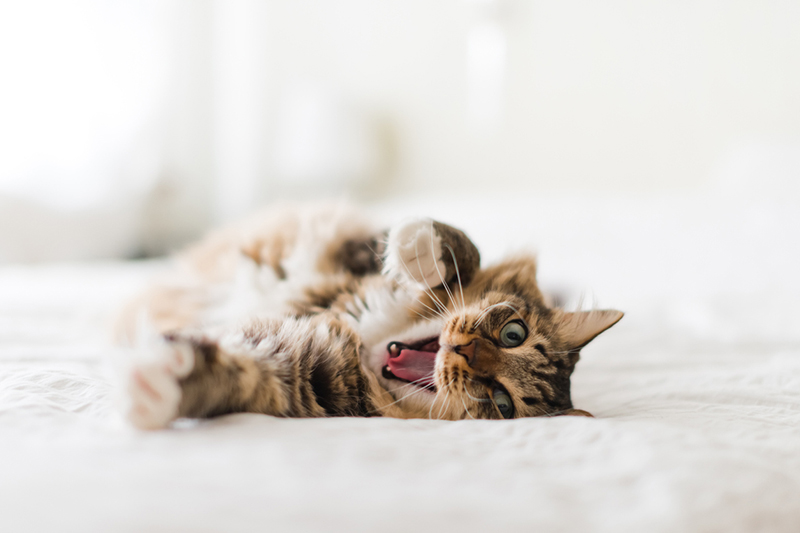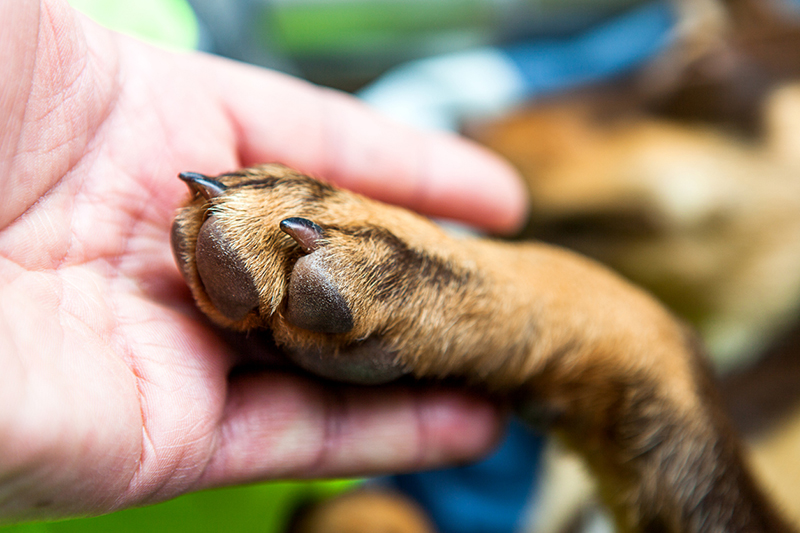8 Fun Facts About Boston Terriers
Sweet, smart, and endlessly entertaining, Boston Terriers are a special breed!
Pee-yew! Did you get a whiff of stinky pet? Sometimes those odors are just a normal part of having a four-legged family member. But other times, they can point to a health problem.
Are you asking yourself, "What pet smells are normal?" Well, first off, not all pet smells are bad. For instance, dogs perspire from their paws, which can make them a tad smelly. They also produce a lightly scented oil that helps keep their skin and coat healthy. In addition, dogs and cats both have glands in their ears and around their hind ends that can have a yeasty smell. All of this is natural, but if an odor gets overpowering or smells particularly bad, there is probably something going on that needs to be addressed.
When it comes to which pet smells need a closer look, let's be frank. Dogs tend to be smellier than cats, but both can have odorous problems that may be cause for concern.

Your pet's breath probably doesn't smell great, which is pretty normal. However, really stinky breath can be a sign that something is wrong in your pet's mouth. They may have bits of food stuck in their teeth, or an infection could be brewing. Odd smelling breath can also be a sign of a health condition, like diabetes. If your pet's breath has turned foul, you should take them to the veterinarian to get checked out.
To help keep your pet's breath smelling fresher and prevent dental disease, you should brush your dog or cat's teeth regularly at home and take them in for annual dental cleanings at your veterinarian. Your veterinarian can detect issues in hard to see areas like under the gum line and thoroughly clean their teeth. A recent study also found that one dental cleaning a year can help your dog live longer. It was associated with a nearly 20% decreased risk of death.
Of course, you can’t give your dog the mouthwash in your bathroom, which is harmful for dogs, but you can buy products designed to make their breath smell better. There are chews, treats, and even water additives available. Talk to your veterinarian about safe options for your dog. In addition, you should offer your dog plenty of toys to chew on, which can help keep their teeth clean and combat bad breath.
Bad breath can be less of a problem for cats since they may not love to give wet kisses or get in our faces as much as our doggie pals do. But if your cat’s breath is bothering you, you can ask your veterinarian to recommend safe products, such as treats and water additives, that can help. If there is a particular smell like tuna or a certain flavor of cat food making you hold your nose, you can avoid feeding it to them—or wait a while after they've polished off a can to snuggle with them.

Dogs are more likely to have stinky paws than cats who should be kept indoors. If your pet’s paws smell funky, it could be that dirt or other debris has gotten trapped between their toes or paw pads. In this case, you may need to simply wipe or wash their paws off.
Smelly paws can also indicate an overgrowth of yeast, bacteria, or fungus, which flourish in warm, moist places and can smell like popcorn or corn chips. If you have concerns about the way your pet’s feet smell, you should contact your veterinarian. Your pet may need a cream or medication to address whatever is causing the odor.
Here are some things you can try at home to help avoid smelly paws:
Does your pet regularly clear the room? A little bit of gas is absolutely normal, but a lot of flatulence may be due to an illness or an issue with your pet’s diet, such as a food allergy or intolerance.
If your pet is overly gassy, visit your veterinarian to make sure an illness isn’t to blame. If there is no underlying health condition, your veterinarian can work with you to make gradual changes to your dog’s diet to help stop all that farting.
Stinky behinds can happen if your pet gets some poop stuck in the fur around their back end. The problem can be worse if your pet has loose stools or diarrhea. In some cases, you may be able to spot clean the area with a wet cloth. In others, a full bath may be needed. You can help avoid this issue by keeping the fur around your pet’s bottom trimmed.
Anal glands are another cause of stinky behinds. Dogs and cats have glands (called anal sacs) near their rear ends, which excrete a marking scent. If those sacs get impacted, which is much more common in dogs, they can get smelly, itchy, and painful. If you’ve noticed your dog is scooting around the carpet, you should take them to the veterinarian to have a look at those glands.
Your pet's coat may have a light scent from the natural oil that helps keep their fur and skin healthy. If your pet’s coat is really stinky, they’ve likely handled or rolled around in something yucky. In this case, the best solution is probably a bath.
And yes, you can bathe cats, too. While they're typically good at bathing themselves with their tongues, they can need a bath if they’ve gotten something nasty on their fur. A bath will also prevent them from licking off and ingesting whatever got on them, which could upset their stomach.

These top 10 tips can help you prevent and eliminate pet odor (without having to get rid of your pet!):
In addition, keeping your pet healthy can help avoid some stinky situations. Take your pet to the veterinarian regularly so conditions that may cause odors can be caught early. If you have an ASPCA Pet Health Insurance plan with preventive care coverage, you can get reimbursed for a yearly check-up.
The information presented in this article is for educational and informational purposes only and does not constitute or substitute for the advice of your veterinarian.
(opens new window)